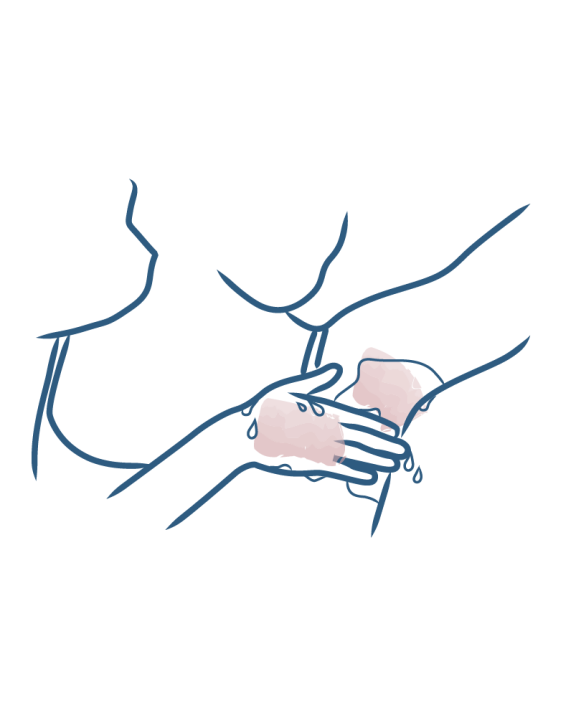Causes of excessive perspiration
- How to treat hyperhidrosis?
- Botulinum toxin injections for preventing hyperhidrosis
- Antiperspirant active ingredients for preventing hyperhidrosis
- Anticholinergic medication for preventing hyperhidrosis
- Surgery for preventing hyperhidrosis
- Iontophoresis for preventing excessive perspiration
- Aluminium salts
- Managing stress and emotions

Causes of excessive perspiration
Body sweating is controlled by the hypothalamus, a small gland located in the brain responsible for regulating sleep, hunger and body temperature, among other things. When our body temperature rises, the hypothalamus detects this and activates our sympathetic nervous system, which controls many of our body’s unconscious activities, including sweating. In case of stress or strong emotion, our nervous system releases hormones (adrenaline and noradrenaline) that activate our sweat glands and thus trigger the sweating process. Sweating is therefore a response to changes in our body.
A vital phenomenon for our body
Why do we sweat? Sweating is a natural and necessary phenomenon. It helps regulate body temperature in case of heat, fever or physical effort. We call it thermoregulatory sweating.
It’s therefore quite normal to sweat even without effort, in fact it is crucial for our body to function properly. It’s our body’s cooling system.
What is sweat?
The composition of sweat depends on many factors, including diet, and our lifestyle in general. Sweat has an acidic pH, close to 5.5, which is the physiological pH of skin. It consists mainly of water and mineral salts, in particular sodium chloride, which explains why it is salty.
Sweat is secreted by two types of glands: the eccrine and apocrine sweat glands, located in the skin’s dermis (deep layer). Its composition varies from one type of gland to another. That secreted by eccrine glands is naturally odorless and fluid. That secreted by apocrine glands is thicker, and initially odorless, but on contact with bacteria it changes and can begin to smell. There is a whole ecosystem on our skin surface composed of bacteria, fungi and viruses which live in symbiosis, called skin microbiota. These bacteria feed on the salts present in sweat and are responsible for the smell.
Excessive perspiration
Excessive perspiration, or hyperhidrosis, occurs when the amount of sweat produced exceeds that necessary for thermoregulation. We speak also of hyperhidrosis when it causes embarrassment and has a strong impact on quality of life.
There are two types of hyperhidrosis:
- Primary hyperhidrosis, the causes of which are not identified
- Secondary hyperhidrosis, caused by a health problem or by taking medication
It is often a taboo subject that people do not always dare to discuss with their doctor. Yet very effective solutions do exist.
Causes of primary hyperhidrosis
There can be many causes of excessive perspiration, and identifying triggers can be difficult.
Primary hyperhidrosis, also called idiopathic hyperhidrosis, is responsible for most cases of excessive perspiration. It affects mainly the armpits, hands and feet. It can occur in certain stressful situations, when experiencing strong emotions, during intense physical effort or heat, and after eating certain foods. The causes of this type of oversweating have not been clearly identified, although it is thought that people may be genetically or hereditarily predisposed. In general, primary hyperhidrosis develops early in life, in childhood or adolescence.
Causes of secondary hyperhidrosis
Secondary hyperhidrosis is linked with a specific health problem or reason. There are multiple causes of this type of hyperhidrosis.
Some
can trigger hyperhidrosis, such as obesity, diabetes, hypoglycaemia, hyperthyroidism and Parkinson’s disease. Certain physiological conditions can also bring on excessive perspiration, for example hormonal changes during menopause. A withdrawal syndrome and alcohol consumption can also cause this disorder.
Various medicinal treatments can cause oversweating too. If you experience sweating disorders after starting a new medicine, always ask your doctor for advice before stopping or changing your treatment. They will help you find the best alternative to manage your condition.
Our care routines
Excessive perspiration

